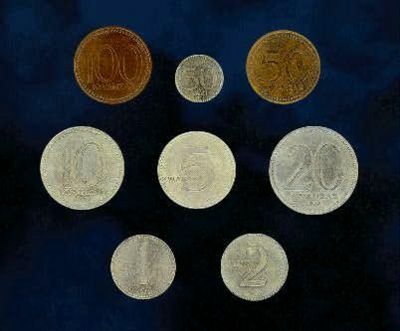安哥拉宽扎
安哥拉宽扎简介
ISO 4217 Code:AOA
User(s):Angola
Inflation:13.2%
Source:The World Factbook, 2006 est.
Subunit:1/100 centimo
Symbol:Kz
Coins:
Freq. used:1, 2, 5 kwanzas
Rarely used:10, 50 centimos
Banknotes:1, 5, 10, 50, 100, 200, 500, 1000, 2000 kwanzas
Central bank:Banco Nacional de Angola
Website:http://www.bna.ao
The kwanza (ISO currency code: AOA, abbreviation also: Kz) is the currency of Angola.
History
Four different currencies using the name kwanza have circulated since 1977.
First Kwanza, 1977-1990
The kwanza was introduced following Angolan independence. The first banknotes were dated 1976 but not issued until 1977. Coins were issued in denominations ranging from 50 lwei to 100 kwanzas. Interestingly, some of the coins were issued witout dates of issue, although all bore the date of independence, 11 November 1973. The last date to appear on coins was 1979.
Novo Kwanza, 1990-1995
The first banknotes were overprints on earlier notes and the denomination was given as novo kwanza. Later banknotes dropped the word novo. Angolans could only exchange 5% of all old notes for new ones; they had to exchange the rest for government securities. This kwanza suffered from high inflation.
Kwanza Reajustado, 1995-1999
Although the exchange rate to the previous kwanza was 1000 to one, such was the low value of the old kwanza that the smallest denomination of banknote issued was 1000 kwanza reajustado. The inflation continued with denominations reaching 5 million kwanza reajustado. No coins were issued.
Second Kwanza, 1999-
The introduction of this currency saw the reintroduction of coins. Although it suffered early on from high inflation, its value has now stabilized.
Coins
Coins in 10 and 50 centimos denominations aren't used any more, as the values are minuscule.
Banknotes
Banknotes are quite similar with only different colours separating them.
Historical exchange rates
Angola's currencies were the Least valued currency unit for several times in the 1990s.
安哥拉宽扎样币 安哥拉宽扎铸币
ISO 4217 Code:AOA
User(s):Angola
Inflation:13.2%
Source:The World Factbook, 2006 est.
Subunit:1/100 centimo
Symbol:Kz
Coins:
Freq. used:1, 2, 5 kwanzas
Rarely used:10, 50 centimos
Banknotes:1, 5, 10, 50, 100, 200, 500, 1000, 2000 kwanzas
Central bank:Banco Nacional de Angola
Website:http://www.bna.ao
The kwanza (ISO currency code: AOA, abbreviation also: Kz) is the currency of Angola.
History
Four different currencies using the name kwanza have circulated since 1977.
First Kwanza, 1977-1990
The kwanza was introduced following Angolan independence. The first banknotes were dated 1976 but not issued until 1977. Coins were issued in denominations ranging from 50 lwei to 100 kwanzas. Interestingly, some of the coins were issued witout dates of issue, although all bore the date of independence, 11 November 1973. The last date to appear on coins was 1979.
Novo Kwanza, 1990-1995
The first banknotes were overprints on earlier notes and the denomination was given as novo kwanza. Later banknotes dropped the word novo. Angolans could only exchange 5% of all old notes for new ones; they had to exchange the rest for government securities. This kwanza suffered from high inflation.
Kwanza Reajustado, 1995-1999
Although the exchange rate to the previous kwanza was 1000 to one, such was the low value of the old kwanza that the smallest denomination of banknote issued was 1000 kwanza reajustado. The inflation continued with denominations reaching 5 million kwanza reajustado. No coins were issued.
Second Kwanza, 1999-
The introduction of this currency saw the reintroduction of coins. Although it suffered early on from high inflation, its value has now stabilized.
Coins
Coins in 10 and 50 centimos denominations aren't used any more, as the values are minuscule.
Banknotes
Banknotes are quite similar with only different colours separating them.
Historical exchange rates
Angola's currencies were the Least valued currency unit for several times in the 1990s.
安哥拉宽扎样币 安哥拉宽扎铸币

附件列表
词条内容仅供参考,如果您需要解决具体问题
(尤其在法律、医学等领域),建议您咨询相关领域专业人士。
